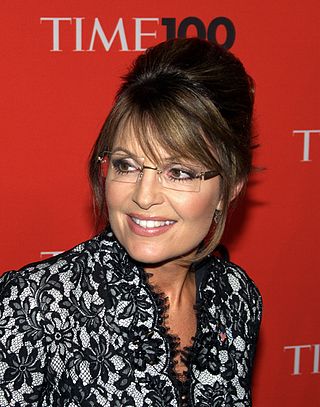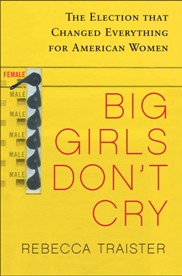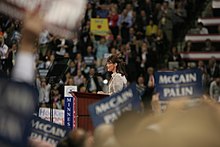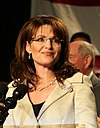
Lisa Ann Murkowski is an American attorney and politician serving as the senior United States senator from Alaska, having held the seat since 2002. She is the first woman to represent Alaska in the Senate and the Senate's second-most senior Republican woman, after Susan Collins of Maine. She became dean of Alaska's congressional delegation upon Representative Don Young's death.

EMILYs List is an American political action committee (PAC) that aims to help elect Democratic female candidates in favor of abortion rights to office. It was founded by Ellen Malcolm in 1985. The group's name is an acronym for "Early Money Is Like Yeast". Malcolm commented that "it makes the dough rise". The saying refers to a convention of political fundraising: receiving many donations early in a race helps attract subsequent donors. EMILYs List bundles contributions to the campaigns of Democratic women in favor of abortion rights running in targeted races.
Soccer mom is a term that broadly refers to an American, Canadian, or Australian, middle-class, suburban woman who spends a significant amount of her time transporting school-age children to youth sporting events or other activities. It came into widespread use during the 1996 United States presidential election and over time has come to take on an unfavorable connotation.

Sarah Louise Palin is an American politician, commentator, author, and reality television personality who served as the ninth governor of Alaska from 2006 until her resignation in 2009. She was the 2008 Republican vice presidential nominee under U.S. Senator John McCain.

The 2008 presidential campaign of John McCain, the longtime senior U.S. Senator from Arizona, was launched with an informal announcement on February 28, 2007, during a live taping of the Late Show with David Letterman, and formally launched at an event on April 25, 2007. His second candidacy for the Presidency of the United States, he had previously run for his party's nomination in the 2000 primaries and was considered as a potential running mate for his party's nominee, then-Governor George W. Bush of Texas. After winning a majority of delegates in the Republican primaries of 2008, on August 29, leading up to the convention, McCain selected Governor Sarah Palin of Alaska as his running mate for Vice President. Five days later, at the 2008 Republican National Convention, McCain was formally selected as the Republican Party presidential nominee in the 2008 presidential election.
Susan B. Anthony Pro-Life America is an American 501(c)(4) non-profit organization that seeks to reduce and ultimately end abortion in the US, by supporting anti-abortion politicians, primarily women, through its SBA Pro-Life America Candidate Fund political action committee.

The sketch comedy television show Saturday Night Live aired several critically acclaimed sketches parodying then Alaskan Governor and vice-presidential nominee Sarah Palin in the lead-up to the 2008 United States presidential election. The sketches featured former cast member Tina Fey, who returned as a guest star to portray Palin. Fey won the Primetime Emmy Award for Outstanding Guest Actress in a Comedy Series for her impersonation of Palin.

Sarah Palin is an American politician, commentator and author who served as the ninth Governor of Alaska from 2006 to 2009. She was the Republican Party nominee for Vice President in the 2008 presidential election alongside Arizona Senator John McCain.

Sarah Palin was a member of the City Council of Wasilla, Alaska from 1992 to 1996 and the city's mayor from 1996 to 2002. Wasilla is located 29 miles (47 km) north-east of the port of Anchorage, and is the largest population center in the Mat-Su Valley. At the conclusion of Palin's tenure as mayor in 2002, the city had about 6,300 residents, and is now the fifth largest city in the state. Term limits prevented Palin from running for a third term as mayor.

Sarah Palin, while serving as Governor of Alaska, was nominated as the first female candidate of the Republican Party for Vice President of the United States. Following the nomination, her public image came under close media scrutiny, particularly regarding her religious perspective on public life, her socially conservative views, and a perceived lack of experience. Palin's experience in foreign and domestic politics came under criticism among conservatives as well as liberals following her nomination. A poll taken by Rasmussen Reports just after the Republican National Convention in the first week of September 2008 found that Palin was more popular than either Barack Obama or John McCain; however, this perception later reversed. At the same time, Palin became more popular among Republicans than McCain. A February 2010 ABC News/Washington Post poll showed 71% of Americans felt Palin lacked the qualifications necessary to be President of the United States.

Levi Keith Johnston is best known as the twice-former fiancé of Bristol Palin and father of their son Tripp. He first received media attention in August 2008 when U.S. vice presidential candidate Sarah Palin announced that her daughter Bristol was five months pregnant by Johnston and that the two were engaged. The couple ultimately ended their relationship, and Johnston and the Palin family engaged in several public feuds.

Marjorie Jones Dannenfelser is an American activist who is the president of the Susan B. Anthony Pro-Life America, an American political organization that seeks to advance anti-abortion women in politics. She was brought into the organization as its executive director in 1993, shortly after its founding by Rachel MacNair.

Game Change is a 2012 American political drama television film based on events of the 2008 United States presidential election campaign of John McCain, directed by Jay Roach and written by Danny Strong, based on the 2010 book of the same title documenting the campaign by political journalists Mark Halperin and John Heilemann. The film stars Julianne Moore, Woody Harrelson, and Ed Harris, and focuses on the chapters about the selection and performance of Governor of Alaska Sarah Palin (Moore) as running mate to Senator John McCain (Harris) in the presidential campaign.

Sarah Palin's candidacy for Vice President of the United States was publicly announced by then-presumptive Republican Party presidential candidate John McCain on August 29, 2008. As part of the McCain presidential campaign, Palin, then the incumbent Governor of Alaska, was officially nominated by acclamation at the 2008 Republican National Convention on September 3. The McCain–Palin ticket lost the 2008 presidential election on November 4 to the Barack Obama–Joe Biden ticket.
Women in conservatism in the United States have advocated for social, political, economic, and cultural conservative policies since anti-suffragism. Leading conservative women such as Phyllis Schlafly have expressed that women should embrace their privileged essential nature. This thread of belief can be traced through the anti-suffrage movement, the Red Scare, and the Reagan Era, and is still present in the 21st century, especially in several conservative women's organizations such as Concerned Women for America and the Independent Women's Forum.

Big Girls Don't Cry: The Election that Changed Everything for American Women is a 2010 non-fiction book written by the American journalist Rebecca Traister and published by Free Press. The book focuses on women's contributions to and experiences of the 2008 United States presidential election. Traister places particular focus on four main political figures—Hillary Clinton, Sarah Palin, Michelle Obama, and Elizabeth Edwards—as well as women in the media, including the journalists Katie Couric and Rachel Maddow, and the comedians Tina Fey and Amy Poehler, who portrayed Sarah Palin and Hillary Clinton on Saturday Night Live, respectively. Traister also describes her personal experience of the electoral campaign and her shift from supporting John Edwards to Hillary Clinton.

The 2022 United States Senate election in Alaska was held on November 8, 2022. Incumbent senator Lisa Murkowski won reelection to a fourth full term, defeating fellow Republican Kelly Tshibaka and Democrat Patricia Chesbro.
Melissa Deckman is an American political scientist. She is the Louis L. Goldstein Professor of Public Affairs at Washington College, where she has also been Chair of the Political Science Department. She studies religion, gender, and American politics. Her research includes books on women and politics, the political activities of clergy members in the United States, and the role of women in the Tea Party movement. She currently serves as the CEO of the Public Religion Research Institute.

The November 2022 United States House of Representatives election in Alaska was held on Tuesday, November 8, to elect a member of the United States House of Representatives to represent the state of Alaska. Democratic incumbent Mary Peltola won reelection to a full term in office, defeating Republicans Sarah Palin and Nick Begich III and Libertarian Chris Bye in the runoff count.

The 2022 Alaska at-large congressional district special election was held on August 16 to fill the seat left vacant after the death of Republican incumbent Don Young. Mary Peltola was elected in a 3-way race against former governor Sarah Palin and Nick Begich III in the election, becoming the first Alaska Native and woman to represent Alaska in the House.



















